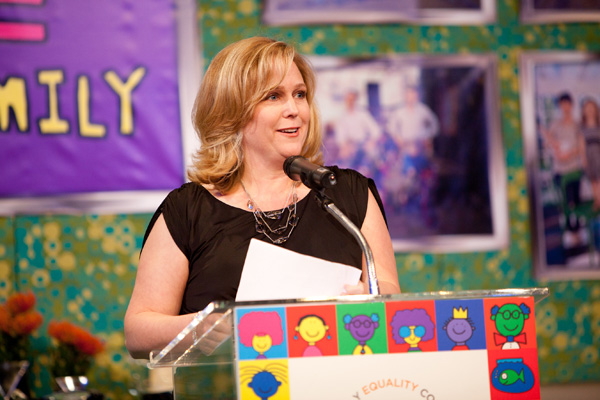The Cost of Equality in Hollywood
 Jennifer Chrisler speaks at a Family Equality Council event in L.A. (Photo courtesy of the Family Equality Council)
Jennifer Chrisler speaks at a Family Equality Council event in L.A. (Photo courtesy of the Family Equality Council)
With great celebrity comes great responsibility. Gifted with the spotlight, the rich and famous have the ability to sway their devoted fans at the drop of a dime. Look no further than the world of advertising. I see Sofia Vergara — the bombshell and ESL mother of Modern Family — drinking a Pepsi, and hey! I want a Pepsi! I want to be just like Sofia (save the heels).
But what happens when celebrity endorsement forgoes the soda and tackles something more meaningful? Sharing a stance on social and political matters is fragile ground to tread for any celebrity, as made evident by Carrie Underwood’s recent bout of fan backlash after voicing support for same-sex marriage. Matters concerning gay rights are perhaps the most prominent issues that have stars showing support and, sadly, facing the consequences. The strife surrounding homosexuality in America may be easily lost on Massachusetts residents, but it continues to be one of the top hot-button social concerns facing our nation today. The fact of the matter is that support from our celebrity elite does make a difference. Anderson Cooper may be lauded for coming out earlier this week, but it’s stoic support from the likes of President Obama that helps create an environment where such private matters can be shared in the first place.
Despite it all, Obama, too, faces criticism in light of his same-sex endorsement, which begs the question of whether or not this seesaw of support and inevitable backlash is really worthwhile. We spoke with Jennifer Chrisler, executive director of Family Equality Council, to find out.
What are your thoughts on Carrie Underwood’s fans turning on her after she came out supporting same-sex marriage?
“I think it’s a shame that that is the consequence for her when she stands up for something that is right and just. She’s standing up for people who need to be stood up for, speaking her heart and what she believes … She needs to be commended and heralded, not shot down.”
Do you think fan backlash is something that should be considered when voicing support of gay rights in Celebrity America?
“I would hope they wouldn’t consider it and just speak the truth of what they believe about the issue. I think the practical reality is that we’ve seen that sometimes there can be a backlash, but I think they should do the right thing regardless of that potential. [The backlash] is disproportionately small in comparison to the praise.”
Do you think celebrity endorsement — whether from Carrie Underwood, Adam Levine, or President Obama — makes a difference in the fight for equality?
“The reality is that there are many people living in places where they may not have the opportunity to know or connect with LGTB people. This is a great substitute for those personal conversations that should be happening around the country but aren’t necessarily happening.
“As a parent, the incredible moment that is the President of the United States saying to my children directly, ‘I value you, I value your family, and you are equal in my eyes,’ I think is one of the most incredible things I’ve ever been witness to.”
Would you say that President Obama is the single most important person making a difference today?
“I think that he is an incredibly important figure in moving the conversation forward, but I don’t think there is any single most person making a difference. The everyday [LGTB] people in our society are the real heroes. The people who are doing the most are the people who are living their lives under tough situations.”
What do you see in the coming years for the fight for equality?
“I think marriage equality in all 50 states is not that far away. Total equality under the law is achievable and totally possible … [but] it’s one thing to be equal under the law and another to be celebrated within the people of your community.”
Are gay rights much of a concern in Massachusetts?
“There’s good news and bad news on that front. The reality is that we have had marriage equality in Massachusetts for many, many years, and I think that has helped create an environment where equality is expected. But I also think that there’s still a lot of work to do in Massachusetts, particularly with young people, and I think that we are incredibly well positioned to help influence the debate at the higher, national level.”
Family Equality Council is a Boston-based, national non-profit organization that connects, supports, and represents the one million parents who are lesbian, gay, bisexual, and transgender in this country and the two million children they are raising. Learn more at familyequality.org.
This interview has been edited and condensed.


